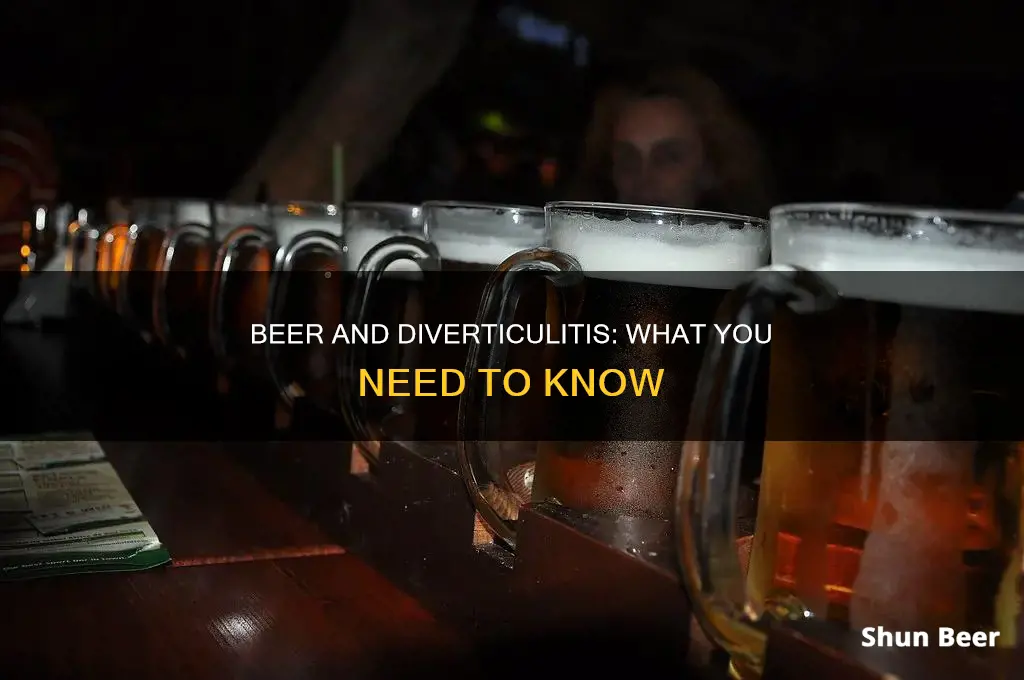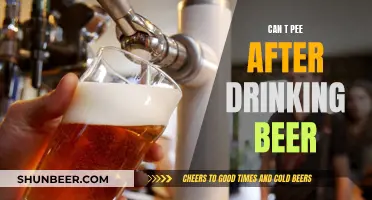
Diverticulitis is a condition where pouches exist in the intestines and become inflamed. While the existence of these pouches in the body is called diverticulosis, the condition of diverticulitis is when the pouches become inflamed. Alcohol consumption can trigger diverticulitis symptoms and increase the frequency of flare-ups. It is believed that individuals who drink alcohol are at a higher risk of developing diverticulitis and may experience more severe symptoms. However, the exact cause of diverticulitis is not fully understood.
| Characteristics | Values |
|---|---|
| Can you drink beer when you have diverticulitis? | It is not advisable to drink beer or any other alcoholic beverage when you have diverticulitis. |
| Reasoning | Alcohol can trigger diverticulitis symptoms and increase the frequency of flare-ups. Alcohol consumption can also lead to further complications, especially if you are taking medication. |
| Alcohol consumption and risk of diverticulitis | Studies have found a correlation between increased alcohol consumption and the occurrence of diverticulitis. |
| Alcohol consumption and existing diverticulitis | Individuals who drink alcohol when they have diverticulitis may be at risk of more severe symptoms. |
What You'll Learn
- Alcohol consumption may increase the risk of developing diverticulitis
- Alcohol may cause gastric irritation for those with diverticulitis
- Alcohol interacts negatively with antibiotics used to treat diverticulitis
- Alcohol may cause intestinal irritation and trigger a diverticulitis flare-up
- Alcohol may not be the exact cause of diverticulitis

Alcohol consumption may increase the risk of developing diverticulitis
Several studies have found a link between alcohol consumption and an increased risk of developing diverticulosis and diverticulitis. For example, a study published in the Journal of Clinical Gastroenterology in 2013 found that alcohol consumption is a risk factor for colonic diverticulosis. The study included 746 patients who underwent a colonoscopy and found that alcohol use was the second most identifiable risk factor for diverticulosis, after age. Another study, a meta-analysis published in the Hawaii Journal of Medicine and Public Health in 2017, found that alcohol consumption on a regular basis was associated with a nearly two-fold increase in the odds of developing diverticulosis.
However, it is important to note that the research on the link between alcohol consumption and diverticular disease is conflicting. Some studies have found no association between alcohol consumption and diverticulosis or diverticular bleeding. Additionally, the exact mechanism for how alcohol may increase the risk of diverticular disease is not fully understood. One possible explanation is that alcohol causes dehydration, which can lead to hard stools and increased straining during bowel movements, increasing the risk of diverticular formation. Another possibility is that alcohol slows intestinal motility, leading to constipation and increased pressure in the intestines.
Given the potential risks associated with alcohol consumption and diverticular disease, it is advisable for individuals with diverticulosis or diverticulitis to limit or avoid alcohol consumption. Alcohol can irritate the stomach and cause gastric inflammation, especially during a diverticulitis flare-up. It can also interact negatively with certain antibiotics used to treat diverticulitis, such as Flagyl (metronidazole), leading to side effects like nausea, vomiting, headaches, and abdominal pain. Therefore, it is generally recommended to avoid alcohol during a diverticulitis flare-up and when taking antibiotics.
Beer and Chemo: What's Safe?
You may want to see also

Alcohol may cause gastric irritation for those with diverticulitis
Alcohol consumption can trigger diverticulitis symptoms and increase the frequency of flare-ups. It is believed that individuals who drink alcohol are at a higher risk of developing diverticulitis and may experience more severe symptoms. Additionally, alcohol can negatively interact with certain pain medications and antibiotics used to treat diverticulitis, leading to symptoms such as dizziness, stomach upset, and vomiting. Therefore, it is generally recommended to avoid alcohol completely during a diverticulitis flare-up to prevent gastric irritation and other problems.
The impact of alcohol on diverticulitis may be due to its effects on the gastrointestinal tract. Alcohol can impair the movement of food through the intestine, specifically decreasing motility in the lower intestine (rectosigmoid). This reduced motility has been associated with the development of diverticulosis. Alcohol can also cause mucosal injury, impair nutrient absorption, and lead to various gastrointestinal disorders.
Furthermore, those who consume alcohol tend to have a poorer diet, which can contribute to worsened diverticulitis symptoms. Research has shown that regular alcohol consumption is linked to a higher risk of developing diverticulitis, often due to poor diet choices. On the other hand, moderate alcohol consumption alongside a balanced diet has been associated with a lower risk.
While the exact cause of diverticulitis is not fully understood, factors such as age, obesity, smoking, genetics, and a low-fiber diet may contribute to its development. It is important to note that alcohol recovery is a lifelong process, and relapses are possible. If you are experiencing diverticulitis symptoms or are concerned about your alcohol consumption, it is best to consult with your doctor for personalized advice and treatment options.
Beer and Brain Damage: Is There a Link?
You may want to see also

Alcohol interacts negatively with antibiotics used to treat diverticulitis
Diverticulitis is a complication of diverticulosis, which is a condition marked by pouches or stretched-out areas in the digestive tract. When these pouches become inflamed or infected, it is called diverticulitis.
Diverticulitis is usually treated with antibiotics and a bland, low-fibre diet. Antibiotics used to treat diverticulitis include metronidazole, sulfamethoxazole, trimethoprim, ciprofloxacin, amoxicillin, and clavulanate.
Alcohol can negatively interact with antibiotics used to treat diverticulitis. These negative interactions can cause symptoms such as dizziness, stomach upset, drowsiness, vomiting, diarrhoea, flushing, headache, and rapid heart rate. Therefore, it is recommended to avoid drinking alcohol while taking antibiotic medication.
Stent Surgery: Beer Drinking Post-Op – Safe or Not?
You may want to see also

Alcohol may cause intestinal irritation and trigger a diverticulitis flare-up
Alcohol may irritate the intestines and trigger a flare-up of diverticulitis. Alcohol negatively affects the gastrointestinal tract, impairing the movement of food as it passes through the intestine. This decreased motility in the lower intestine (rectosigmoid) is associated with the development of diverticulosis. Alcohol can also cause mucosal injury, impair motility, and inhibit the absorption of nutrients, resulting in various gastrointestinal disorders.
Drinking alcohol is linked to a higher risk of developing diverticulosis and diverticular disease. The more alcohol patients consume, the greater their chances of developing diverticulosis. Alcohol consumption increases the risk of developing diverticulosis almost twofold. The exact mechanism is unknown, but it is thought that increased intra-colonic pressure secondary to impaired colonic motility from alcohol may be a factor.
Alcohol consumption can also lead to complications for those with diverticulitis. It can trigger symptoms and increase the frequency of flare-ups. Alcohol interacts adversely with many medications used to treat diverticulitis, and those who consume alcohol tend to have a poorer diet, which can worsen diverticulitis symptoms. Research has shown that those who consume alcohol regularly are at a higher risk of developing diverticulitis, often due to their poor diet choices.
Therefore, it is recommended that individuals with diverticulitis avoid alcohol completely to reduce symptom flare-ups and other problems.
Beer and Colonoscopy: What's the Safe Timeline?
You may want to see also

Alcohol may not be the exact cause of diverticulitis
In addition, alcohol consumption can trigger diverticulitis symptoms and increase the frequency of flare-ups. If you are taking medications for diverticulitis, alcohol can lead to further complications, so it is recommended to avoid it entirely to reduce the risk. This is because alcohol is known to adversely interact with many medications.
The exact cause of diverticulitis is not fully understood, but factors that could contribute to its formation include a low-fiber diet, obesity, smoking, genetics, and aging. A lack of physical activity has also been implicated in the development of diverticulitis.
It is worth noting that the research on the link between alcohol consumption and diverticulitis has been somewhat mixed. While some studies suggest that drinking alcohol is linked to a higher risk of developing diverticulitis, a research review in 2017 concluded that alcohol does not seem to be a risk factor. This review also noted that additional research is needed.
Tramadol and Non-Alcoholic Beer: Safe Mix or Not?
You may want to see also
Frequently asked questions
It is not advisable to drink beer or any other form of alcohol if you have diverticulitis. Alcohol can trigger diverticulitis symptoms and increase the frequency of flare-ups. It can also negatively interact with medications used to treat the condition.
Diverticulitis is a condition where pouches exist in the intestines and become inflamed. The intestines may develop one or more of these pouches, called diverticulosis. While having the pouches in the intestines isn't necessarily harmful, they can become problematic when they get infected and cause pain and other health complications.
Risk factors for diverticulitis include age (people over 40 are at the highest risk), excessive alcohol consumption, a low-fibre diet, and a sedentary lifestyle.







